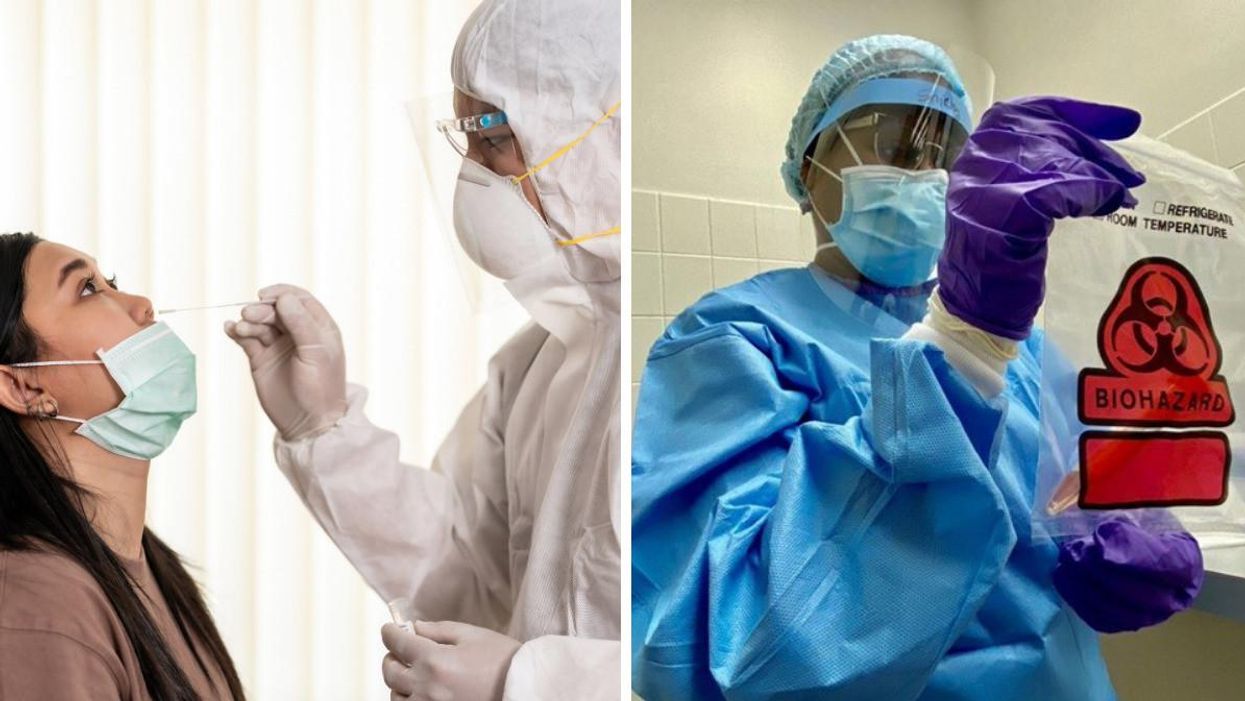Doctors Are Calling Out A 'Deltacron' Report & They Don't Buy It As A COVID 'Super Variant'
One researcher says he saw Delta and Omicron combine in Cyprus.
A researcher in Cyprus claims that he just saw a COVID-19 mutation that combines the Delta and Omicron variants, but global health experts are skeptical about the report.
Professor Leondios Kostrikis, who teaches biological science at the University of Cyprus, told Sigma TV on Friday that he spotted a mutation combining elements of both COVID strains, Bloomberg News reports. He says his team has seen the combo in 25 cases so far and they've uploaded their findings to the global COVID database.
“There are currently Omicron and Delta co-infections and we found this strain that is a combination of these two,” he said, before dubbing the combo "Deltacron."
But health experts were quick to cast doubt on the report, with some comparing it to "flurona" — a scary-sounding combo word for when COVID and the flu hit a patient at the same time, without merging into one.
"There's no such thing as Deltacron," Dr. Krutika Kuppalli, a pandemic expert at the World Health Organization, tweeted on Sunday, after the term spread widely on social media.
"Omicron and Delta did NOT form a super variant," she wrote. She added that the result was probably due to a bit of lab contamination involving two different strains.
"Let's not merge [...] names of infectious diseases and leave it to celebrity couples," she later wrote.
Kuppalli isn't the only one who is unconvinced by Kostrikis' claims.
Dr. Tom Peacock, an infectious disease specialist at Imperial College London, also tweeted that the combo looks like a lab error after taking a look at the data.
Small update: the Cypriot 'Deltacron' sequences reported by several large media outlets look to be quite clearly contamination - they do not cluster on a phylogenetic tree and have a whole Artic primer sequencing amplicon of Omicron in an otherwise Delta backbone.— Tom Peacock (@Tom Peacock) 1641673094
Daniel Kuritzkes, the chief of infectious disease at Brigham and Women's Hospital in Boston, told NBC 10 that it's way too early to start worrying about a "Deltacron" team-up.
"We know that people can get infected with a mixture of different coronavirus strains," he said. "And then those strains have an opportunity to mix together and do what we call recombination that generates these sort of hybrid viruses.
"Whether this is going to take off in the way that Delta did or that Omicron has done — only time will tell."
Researchers have reported some "recombinant" COVID pairings in the past, although they haven't earned mash-up names or become variants of concern.
The researcher who announced Deltacron insists that he didn't make a mistake in the lab.
The health minister of Cyprus has promised a news conference to address the situation later this week, the South China Morning Post reports.
Global health expert Dr. Boghuma Kabisen Titanji says recombination does happen and it's not helpful to come up with wild names every time it occurs.
On the #deltacron story, just because I have been asked about it many times in the last 24h, please interpret with caution. The information currently available is pointing to contamination of a sample as opposed to true recombination of #delta and #omicron variants.— BK Titanji #ILookLikeAScientist (@BK Titanji #ILookLikeAScientist) 1641743180
Instead of naming variants "like a 'Transformers' villain," she says the best strategy is to simply get people vaccinated.
This article's cover image was used for illustrative purposes only.
